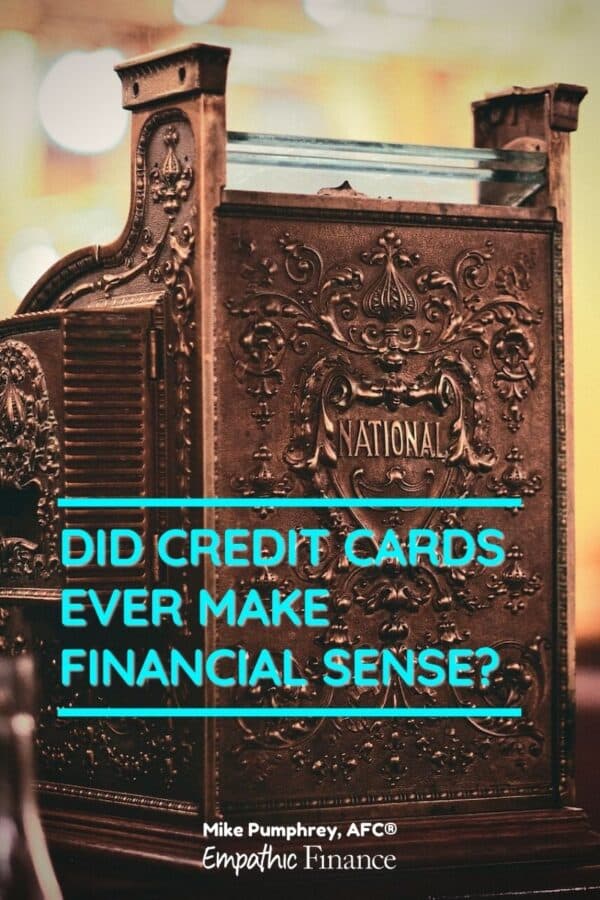In its long history, the original purpose of credit cards, to buy something without paying for it yet, was never a good financial decision.
There are very few good reasons to use a credit card, and almost no good reasons to use one for everyday spending.
Over the past few years, I’ve given you pretty much every argument you need against using credit cards for everyday spend. It can keep you from truly knowing how much money you have. It causes you to spend more. The risks of using a debit card are overstated. It hurts those with lower-incomes. And you’re helping to enrich a company you probably don’t like.
So at this point, if you’re still pushing back and saying, “but travel points!” we’ll just have to agree to disagree. Enjoy thinking that you’ve gotten one over on the credit card companies!
But let’s take a step back. Before cash back and airline miles, a credit card (and the charge card before it) was just a way to pay for things without paying for them yet.
But does even that make any sense, financially, for the consumer? I’m not sure it ever did.
Table of Contents
Credit card history: Charge cards
Before there were credit cards, there were “charge cards”.
Charge cards were like credit cards, except revolving balances weren’t allowed. When your statement came, you had to pay the entire balance.
It has its founding in the 1950s, it was designed as a way to make payments at restaurants around New York City without having to carry around cash, which feels so very New York City to me.

But the charge card is a wild concept today, and it’s mostly fallen out of favor. Only American Express still makes a charge card today.
Bank of America came up with the first modern revolving credit card a few years later, which evolved into VISA. And soon we were off to the races.
Something for nothing
It’s not for nothing that Bank of America literally mailed out 60,000 credits card to people in the first town they tried this out. No application process or anything. This isn’t legal today, but in terms of credit, this was the wild west.
And it worked.
I’m not surprised. The mental benefit of credit cards is that it allows you to purchase something without paying for it. You do have to pay for it eventually, but you’re separating the purchase (the fun part) from the payment (the not fun part).
And in putting the fun part first, they made the brilliant (if obvious) point that we want to do the fun stuff now, and like to put off the not-fun stuff to later.
And plus, it allows us to feel like we’re getting something for nothing. After all, it takes no effort to rack up thousands of dollars in credit card debt.
Why push it out?
So a credit card is fundamentally a method of time-shifting a payment to later.
But all of this obscures a somewhat more pedestrian question: how does it benefit you to time-shift a payment to later?
I mean, you have to eventually pay for the thing, so what good does it do you to push it out one month, two months, or even a year?
And, don’t forget that you pay for this privilege to push the payment out further. It’s not free. So you’ve pushed out a payment that you eventually have to make, and paid a small extra price to make it happen later.
Emotionally, it benefits you by allowing to buy things without paying for them.
Financially, it doesn’t seem to benefit you at all.
If you can’t afford it now
The other reason why people use credit cards is because they can’t afford to pay for it now. So they get the thing now, and then pay for it later.
But this just obscures another issue: if you can’t afford it now, what makes you able to afford it later?
It’s simple, you can’t. Not unless you’re about to get a big raise, or a bonus from work.
It does allow you to pay for something in installments, but, again, you pay for this privilege.
And you can pay a lot.
If I buy a $2,000 airplane ticket, and put it on a 20% credit card, and pay $200 a month, It will take me a year to pay it off, and I’ll have paid almost $200 in extra fees for the privilege. (If I pay less, my fees only increase.)
Meanwhile, if I save $200 for a year and then buy the ticket, it won’t cost me anything. It’s the exact same timescale, just with a little bit more forethought put into it.
Credit cards are not here to benefit you
Now, I’m not saying cut up all your credit cards. I’m not Dave Ramsey. In fact, here are the times I use credit cards in my personal life. (I don’t use credit cards in my business.)
But I am saying that, even at its most basic use, buying now and paying later, credit cards do not truly benefit you.
What does benefit you? Planning purchases in advance, tracking your money, and patience. Sure, it might be less fun in the moment, but not having to worry about money is way better than ignoring it entirely.



